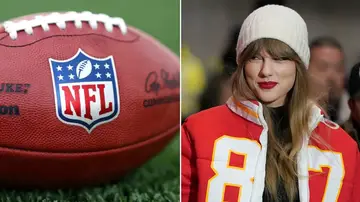In an unexpected move, the NFL has revealed that Taylor Swift will be prohibited from attending Kansas City Chiefs games starting in the 2025 season. This decision, effective from the season opener in Berlin, Germany, signals a dramatic shift in the league’s approach to celebrity involvement and its relationship with the media, particularly the intense attention surrounding Swift’s presence at Chiefs games. This new policy has already sparked considerable debate, as it is expected to alter both the dynamics of the Chiefs’ games and the NFL’s international marketing strategies.

Over the past year, Taylor Swift’s association with the Kansas City Chiefs has become one of the most talked-about topics in the NFL. The world-renowned singer, who boasts an immense following and record-breaking albums, became closely linked to the Chiefs following her public relationship with tight end Travis Kelce. Her appearances at the team’s games, often accompanied by a glamorous entourage, quickly turned into a media sensation.
What began as a private relationship soon evolved into a global spectacle, with tabloids and paparazzi tracking Swift’s every move at the stadium. As the relationship progressed, Swift’s attendance at the games frequently overshadowed the action on the field. Cameras zoomed in on Swift in luxury suites, while fans and commentators speculated on how her presence might influence Kelce’s performance. Swift’s arrival at the stadium became an event of its own, generating a flurry of headlines, social media buzz, and endorsements for both the singer and the team.
While the attention certainly benefited the Chiefs and Kelce, it presented challenges for the NFL. The league, which has long been focused on athletes and their performances, began to feel that the spotlight on Swift’s personal life was distracting from the sport itself. Some fans enjoyed the added excitement, while others criticized the media focus, feeling it diverted attention away from the athletes and the game. This growing tension between celebrity culture and the sport ultimately led to the NFL’s decision to impose the ban starting in 2025.
The league’s decision to enforce the ban at the season opener in Berlin marks a pivotal moment in the NFL’s global expansion. As the NFL has worked to increase its international presence, with games held in cities like London and Munich, the Berlin opener in 2025 will be a key step in solidifying the league’s foothold in Europe. However, the NFL also faces the challenge of managing how celebrity culture influences its brand on the international stage. As the league continues to expand its audience, it must balance the allure of celebrity with the integrity of the game itself.
While Swift’s presence certainly boosted visibility for the Chiefs, the NFL’s stance may signal a desire to create a more controlled environment at its games, particularly when it comes to celebrity involvement. This policy is likely to stir discussions within both the sports and entertainment industries. Some fans may view the ban as an unnecessary intrusion into personal matters, while others may see it as a return to a more traditional focus on the sport.
The decision to begin the ban with the Berlin game suggests a broader shift in the NFL’s handling of celebrity participation in its global events. Germany, with its growing interest in American football, will undoubtedly see the absence of one of the world’s most famous celebrities as a defining moment. For many, the 2025 season will be marked by this significant change, as the NFL asserts control over its image on the international stage.
While it remains to be seen how Swift’s fans and the wider public will react to the ban, the NFL’s move indicates a strong desire to prioritize the sport over the surrounding spectacle. This policy may have lasting implications for how celebrities are involved in NFL events in the future. As the league moves into 2025 and beyond, it will be fascinating to see if the policy is enforced more broadly or if the NFL adjusts to the evolving landscape of sports, media, and celebrity culture.
The 2025 season opener in Berlin will set the tone for this new chapter in NFL governance. Fans, celebrities, and the media will be watching closely to see how this policy plays out and whether Swift’s absence impacts the broader cultural conversation surrounding the league. One thing is clear: the NFL’s decision marks a significant shift in how it navigates the intersection of sports and celebrity, and it will likely remain a topic of discussion for years to come.





